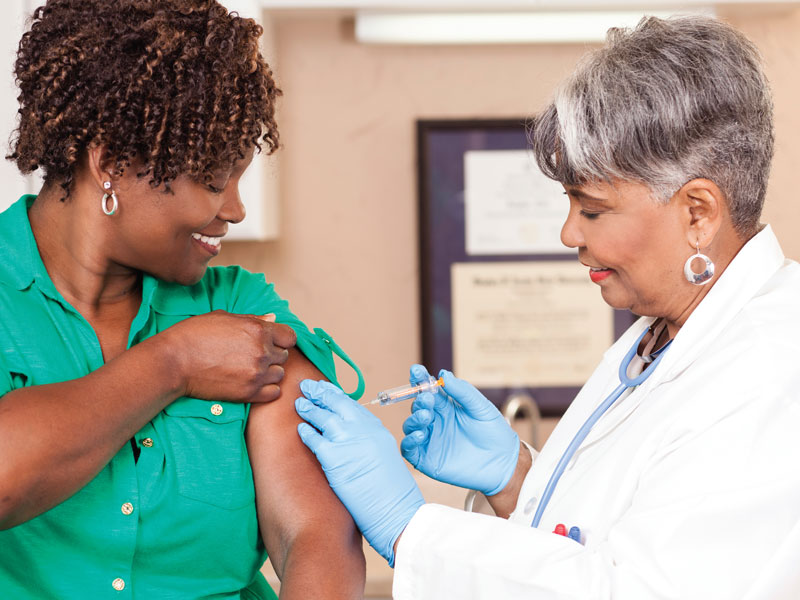FDA Campaign Targets Youth Tobacco Use With Classroom Education

What’s the real cost of youth vaping? In a campaign to combat the ongoing epidemic, the U.S. Food and Drug Administration (FDA) and Scholastic, which publishes classroom magazines with accompanying teacher guides, provided e-cigarette education materials for middle and high school students to teach young Americans about the risks of e-cigarette use and nicotine addiction.
Be Alert for Axillary Adenopathy After COVID-19 Vaccination

Nearly 60 million people in the United States and almost 200 million around the world have received the COVID-19 coronavirus vaccine as of mid-February 2021, and the numbers will continue to grow as more doses come to market and other manufacturers’ versions receive emergency use authorizations. As more people get vaccinated, some of the expected side effects are being observed in clinical practice and have implications for cancer care.
COVID-19 Affects Cancer Caregivers, but Here Are Ways to Support Them

Cancer caregivers are silent and sometimes forgotten victims of the COVID-19 coronavirus pandemic. Its impact on patients with cancer and healthcare providers is widely discussed, but it also affects caregiver responsibilities and burden.
- Read more about COVID-19 Affects Cancer Caregivers, but Here Are Ways to Support Them
- Add new comment
Coalitions Cement Nursing’s—and ONS’s—Position in Health Policy

Through two letters—one to President Joe Biden and Vice President Kamala Harris and another to U.S. Senate and House leaders—the Nursing Community Coalition, on whose steering committee ONS sits, congratulated policymakers while outlining the need for continued support of nurses in health care.
CMS Changes to Medicare Prescription Coverage Could Affect Patient Care

From Teddy Roosevelt to JFK, presidents throughout history have sent legislation to Capitol Hill with the intent to expand healthcare coverage to more Americans. Finally, when Lyndon B. Johnson drafted a bill and pushed it through Congress by expanding sections of the Social Security Act, Medicare become an entitlement and is now implemented by the Centers for Medicare and Medicaid Services (CMS). During the past 50 years, federal health coverage has grown to include Medicaid, maternal and childcare assistance, public health programs, and prescription medication pricing.
- Read more about CMS Changes to Medicare Prescription Coverage Could Affect Patient Care
- Add new comment
Mortality Rates After Cancer Surgery Decrease, but Racial Disparities Remain

During the past 10 years, mortality rates after cancer surgery have improved by 0.12%–0.14%, depending on race, researchers reported in study findings published in JAMA Network Open. However, the gap between outcomes for Black and White patients remains, they found.
- Read more about Mortality Rates After Cancer Surgery Decrease, but Racial Disparities Remain
- Add new comment
COVID-19’s Implications for People With Cancer and Oncology Nurses

Since the World Health Organization declared it a pandemic on March 11, 2020, the COVID-19 coronavirus—the greatest global public health emergency in a century—has disrupted or delayed many aspects of life, including cancer care. But it’s also opened new opportunities for nursing innovation and brought much-needed change to health care. Here’s where we are one year later.
FDA Approves Trilaciclib to Reduce Chemotherapy-Induced Myelosuppression

On February 12, 2021, the U.S. Food and Drug Administration (FDA) approved trilaciclib (Cosela™) as the first therapy in its class to reduce the frequency of chemotherapy-induced myelosuppression in adults receiving certain types of chemotherapy for extensive-stage small cell lung cancer. Trilaciclib inhibits cyclin-dependent kinase 4/6 (CDK 4/6) enzymes to prevent bone marrow damage.
- Read more about FDA Approves Trilaciclib to Reduce Chemotherapy-Induced Myelosuppression
- Add new comment
Inclusion in National Repository Helps Move ONS Guidelines™ Evidence to Practice

When they launched in 2020, oncology nurses recognized the first five ONS Guidelines™ for cancer treatment-related symptoms and adverse events as the evidence-based standard for patient care. Now, the ECRI Guidelines Trust, a national evaluation organization, has given them that distinction as well, including all of ONS’s current guidelines in its repository.
- Read more about Inclusion in National Repository Helps Move ONS Guidelines™ Evidence to Practice
- Add new comment
The Case of the Sensitive Staging System

Marianne, an oncology nurse navigator, is preparing a cancer treatment summary and survivorship care plan for Sylvia, who finished breast cancer treatment six weeks ago. Sylvia was treated with neoadjuvant therapy followed by mastectomy, reconstruction, and radiation. Her tumor was characterized as multifocal invasive ductal carcinoma, grade 2, estrogen and progesterone positive, and HER2/neu negative. Sylvia has no family history of breast cancer. Marianne notices that the oncologist recorded Sylvia’s cancer as a stage IB. Marianne wonders if the stage was determined before or after chemotherapy and surgery.





